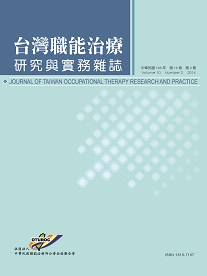Journal of Taiwan Occupational Therapy Research and Practice

半年刊,正常發行
目的:本研究的目的旨在探討單次按摩對嬰兒之家嬰兒的行為和生理反應的影響。方法:共有10位年齡為1~4個月的足月產嬰兒(6位為男生,4位為女生)參加本研究。參加嬰兒在收案時都沒有任何身體畸形、染色體、基因、神經肌肉等問題或診斷。研究設計採用交叉設計法。每位嬰兒在1 週內分別接受1次15分鐘的按摩和陪伴情境試驗。在兩種情境試驗前、中、後,嬰兒心電圖和清醒狀態的資料均會被同步收集。此外,在按摩和陪伴期間,研究者對嬰兒的安撫行為亦會被記錄。結果:統計結果顯示嬰兒在不同情境前以及情境期間,其各清醒狀態所佔的時間百分比和各生理參數如每分鐘心跳值和各心跳變異參數如高頻功率、低頻功率、低高頻功率比值均無明顯地差異。在陪伴期間,研究者安撫嬰兒行為的次數明顯高於按摩期間( = .046)。在情境後,相較於陪伴後,嬰兒在按摩後20分鐘內,睡眠期(深睡和淺睡)所佔時間百分比明顯較少( = .041),而清醒期(安靜和活動清醒)的百分比則較高( = .014)。並且,嬰兒的低頻功率(此值乃反應交感神經的活性)在兩種情境後的變異量有明顯不同( = .022)。相較於情境前的數值,按摩後此值呈現上升,陪伴後則呈現下降情況。其餘生理參數的變異量則無明顯地差異。結論:由本研究結果可歸納出兩點結論:(1)嬰兒在接受按摩的當時,其情緒較可維持在一個穩定、平和的狀態;(2)嬰兒在初次接受按摩後,可維持一段較長的清醒狀態,此現象可能與其交感神經系統的活化有關。
Objective: The purpose of this study was to explore the effects of single massage on behavioral and physiological status of the infants who were cared at the baby home. Methods: Ten full-term infants aged between 1 and 4 months were included. Exclusion criteria included confirmed or suspected chromosomal, genetic, or neuromuscular diseases or congenital anomalies. Each infant was involved in two conditions-15 minutes of massage and play. The infants alert states and electrocardiogram recordings (ECG) were simultaneously collected 10 minutes before, during, and 20 minutes after the conditions. The low-frequency (LF) and high-frequency (HF) components and the low to high frequency ratio (LF/HF ratio) were then derived from the ECG data as the indicators of automatic nervous system activity. Researcher s consoling behavior during the conditions was also recorded. Results: More consoling behavior was found during the play condition than during the massage condition ( = .05). After massage, infants spent less time in the sleep states ( = .04) and longer time in the awake states ( = .01) compared to that after play. In addition, the change of the LF component from pre- to post- condition in the massage and play conditions was different ( = .02). An increase in LF power was found after massage, whereas a decrease in LF power after play. No other differences were found between the two conditions at the period of time before and that during the conditions. Conclusions: The findings suggest that infants have stable and peaceful mood during massage than play. Furthermore, single massage helps infants maintain longer awake states that may be related to the activation of sympathetic system.












